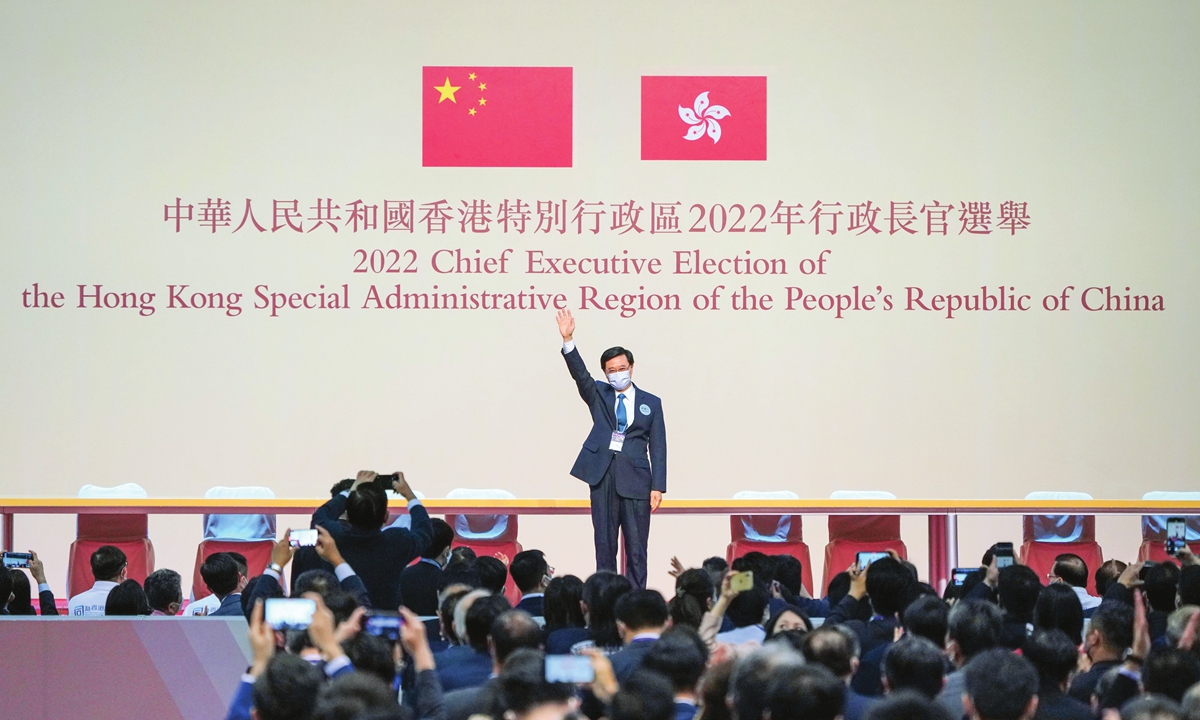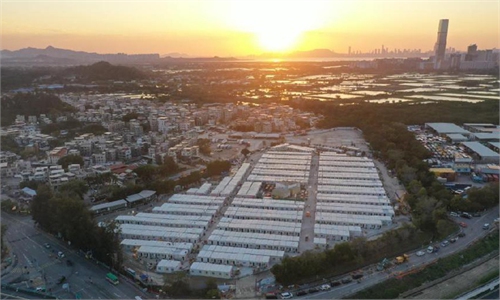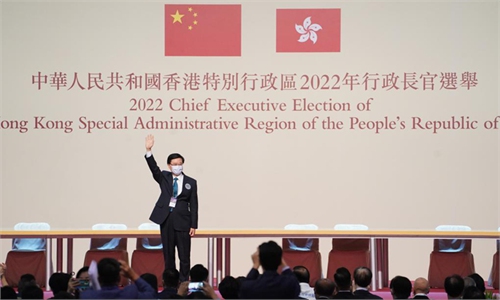HK firms have strong expectations for stable business environment as new leader elected

John Lee waves to people after winning the election of the sixth-term chief executive of the Hong Kong Special Administrative Region on May 8, 2022. Photo: cnsphoto
Hong Kong businesses have high expectations for a stable business environment as John Lee Ka-chiu is elected as the sixth-term Chief Executive of the Hong Kong Special Administrative Region (HKSAR).Closer integration with the Chinese mainland market after the opening of a new chapter is highly anticipated, as the mainland market is huge and remains attractive for enterprises from Hong Kong, business insiders said.
"Hong Kong's biggest advantage in the past was stability. Hong Kong can no longer withstand setbacks after the turmoil in 2019 and nearly three years of the Covid19, and I believe that the greatest hope for the business community is prosperity and stability," Michael Li Chi-fung, vice honorary secretary of the Hong Kong Chinese Importers' & Exporters' Association, told the Global Times on Sunday.
What he anticipated is shared by members of the business community in Hong Kong, who have great expectations for John Lee as he has pledged to adopt a results-oriented approach and foster new features of governance.
The election came amid a contraction of Hong Kong's local economy, ending a streak of yearly expansions over the previous four quarters caused by weak demand domestically and externally.
The SAR's GDP fell by 4 percent in real terms in the first quarter this year, compared with a 4.7 percent rise in the fourth quarter of 2021, the Census and Statistics Department of the Government of the HKSAR revealed.
Financial Secretary Paul Chan Mo-po said on Sunday that the recovery of HK economy will take time, and the external environment will continue to be uncertain and risks may grow, all of which mean the SAR will face a daunting job to grow the economy this year.
Hong Kong businesses are paying close attention to the epi-demic in the mainland as HK-based businesses look forward to starting their operations in the mainland, but they also under-stand that it will take some time for the complete control of the virus, according to Li.
He suggested a flexible quarantine mechanism to maintain nor-mal interactions between the two markets, such as when the number of infections in Hong Kong exceeds 100, those entering the mainland will need to be quarantined for seven days, and if the number surpasses 1,000, then for 14 days.
The HKSAR government has implemented counter-cyclical measures to boost economic development, but local enterprises still need to work harder, Li noted.
"Keeping COVID-19 outbreaks under control and stable is a sig-nificant way to promote local economic development, but most businesses are looking forward to welcoming more consumers from the Chinese mainland since Hong Kong is an external-oriented economy," Li said.
The Chinese mainland market is appealing to HK enterprises, but many of their products and services are not able to fully make their way to the mainland as there remain obstacles, such as regulatory differences, to tackle.
Li added that Hong Kong is ideal for enterprises from the main-land seeking to raise capital, as China-US political tensions put mounting pressure on US-listed Chinese businesses, noting that the obstacles need responsible authorities from both sides to work on.
Ken Wong, executive vice chairman of the Hong Kong (SME) Economic and Trade Promotional Association, told the Global Times on Monday that small businesses and individual proprie-tors are looking forward to a new chapter in Hong Kong under the new chief executive, calling for more efforts to aid the econ-omy, more measures to bail out troubled businesses, and a reo-pening of the border between Hong Kong and the mainland under the premise of epidemic prevention.
"Despite the challenges caused by the Ukraine crisis and other factors, we are still convinced that Hong Kong's international competitiveness will continue to draw global investors to invest," Wong said.
It is also hoped that Hong Kong can leverage its strength in in-novation to promote medical cooperation within the Greater Bay Area and other cities in the mainland, Wong said.



